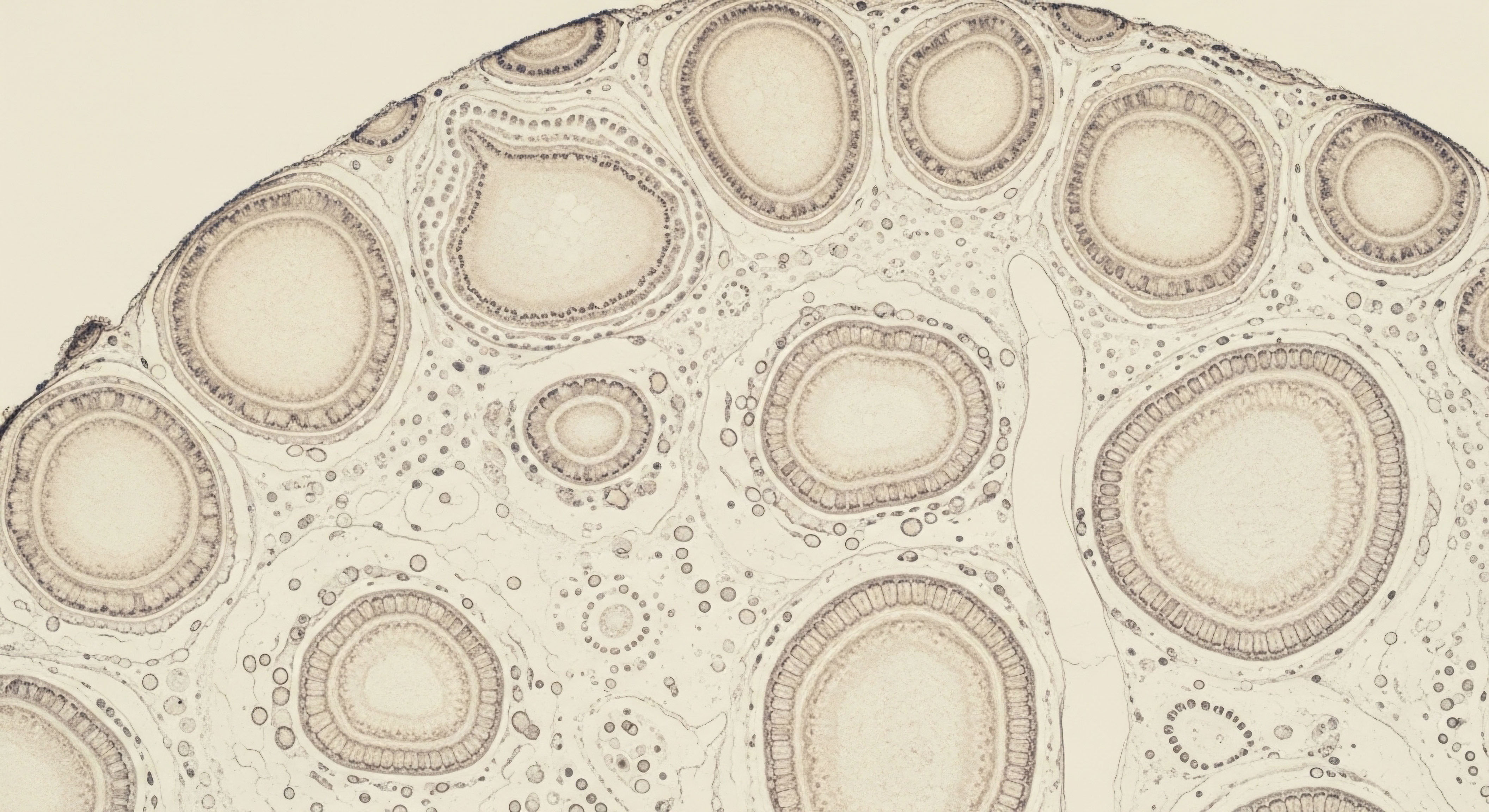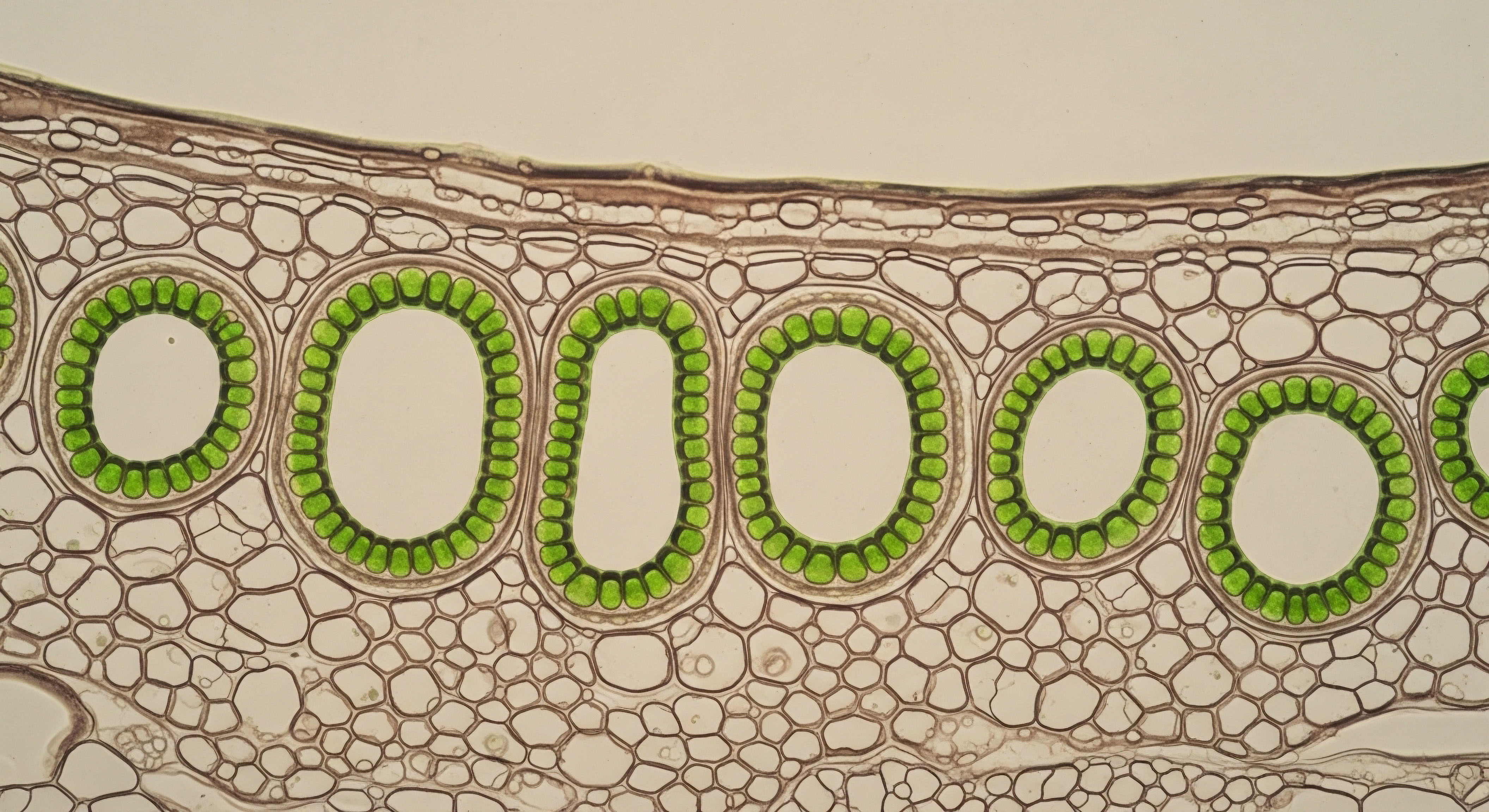

Fundamentals
The conversation about age-related hormone interventions begins within you, in a quiet space of self-awareness. It starts with a feeling, a subtle but persistent signal that your internal world is shifting. Perhaps it manifests as a fatigue that sleep does not resolve, a fog that clouds mental clarity, or a frustrating sense that the vitality you once took for granted has become elusive.
This experience is valid. It is your body communicating a change in its intricate internal language. Understanding the ethical considerations of responding to this communication is the first step in a journey toward reclaiming your biological potential. The core of this exploration is grounded in a deep respect for your autonomy and a commitment to understanding the profound systems that govern your well-being.
Your body operates through a sophisticated communication network known as the endocrine system. Think of it as an internal postal service, where hormones are the messengers, carrying precise instructions from one part of the body to another. These chemical messengers regulate everything from your metabolism and mood to your sleep cycles and reproductive function.
They are the conductors of your biological orchestra. When we speak of age-related hormonal decline, we are describing a change in the efficiency and clarity of this communication system. Messages may be sent less frequently, or the receiving stations ∞ the cellular receptors ∞ may become less responsive. The result is a system that is functioning, yet performing out of tune.
The foundational ethical principle of hormonal intervention is the validation of your lived experience, using objective data to inform a personalized path toward well-being.

The Dialogue of Informed Consent
The decision to engage with hormonal therapies is a significant one, and it rests upon the ethical bedrock of informed consent. This is a process, an ongoing dialogue between you and your clinician. It involves a comprehensive exploration of your symptoms, your health goals, and the objective data from your lab results.
A signature on a form is a procedural artifact; true consent is born from understanding. It means you can articulate not just the name of a therapy, but its mechanism of action ∞ what it is designed to do within your unique physiological landscape. It requires a transparent discussion of the potential benefits, the associated risks, and the alternative pathways available to you. This dialogue empowers you to become an active participant in your own health narrative.
This process must validate your subjective experience while grounding it in objective science. For instance, feeling persistently tired is a real and disruptive symptom. The clinical process connects that feeling to measurable data points, such as levels of thyroid stimulating hormone (TSH), free testosterone, or cortisol.
This transforms a vague complaint into a specific, addressable biological question. The ethical imperative for the clinician is to serve as a translator, making these connections clear and providing you with the knowledge to make a decision that aligns with your values and objectives. The choice to intervene is yours, predicated on a full and transparent understanding of the potential outcomes.

Defining the Scope of Intervention
A central ethical question revolves around the purpose of the intervention. Are we treating a “disease,” or are we optimizing function? The answer lies in a personalized definition of health. The medical lexicon often defines health as the absence of disease.
A more functional, and arguably more humanistic, perspective defines health as the capacity to live with vitality and purpose. Age-related hormonal decline is a natural process. The symptoms that accompany it, however, can significantly diminish quality of life, creating a state of suboptimal function that warrants attention.
The ethical framework for intervention, therefore, is centered on restoration. The goal is to recalibrate your body’s internal communication system to a state of higher function, one that is more aligned with your personal sense of well-being. This perspective respects the natural process of aging while simultaneously affirming your right to address symptoms that compromise your daily life.
It is a collaborative effort to tune your biological orchestra, allowing it to play a more vibrant and resilient score. The ethical path is one that uses science to support your individual pursuit of a full and functional life, at any age.


Intermediate
Advancing from the foundational principles, the ethical application of age-related hormone interventions becomes a matter of clinical precision and physiological respect. The conversation transitions from the ‘why’ to the ‘how,’ focusing on the specific design of therapeutic protocols. A truly ethical approach views the endocrine system as an interconnected web, where adjusting one hormone inevitably influences others.
This systems-based perspective is paramount, especially when implementing protocols for testosterone replacement in both men and women. The responsibility of the clinician extends to designing interventions that honor the body’s complex feedback loops, aiming for a harmonious recalibration of the entire system.

Ethical Protocol Design for Male Hormone Optimization
When addressing low testosterone in men, a common protocol involves the administration of Testosterone Cypionate. A superficial approach might stop there. An ethically robust and clinically sophisticated protocol, however, recognizes that introducing exogenous testosterone will signal the Hypothalamic-Pituitary-Gonadal (HPG) axis to downregulate its own production. The brain perceives high levels of testosterone and, in response, reduces the release of Luteinizing Hormone (LH) and Follicle-Stimulating Hormone (FSH), leading to a decrease in natural testosterone production and testicular atrophy.
The ethical imperative is to support the entire system. This is why a comprehensive protocol includes agents like Gonadorelin. Gonadorelin is a peptide that mimics Gonadotropin-Releasing Hormone (GnRH), the body’s master signal for testosterone production. Its inclusion is an ethical choice to maintain the integrity of the HPG axis, preserving testicular function and fertility.
Similarly, the inclusion of an aromatase inhibitor like Anastrozole addresses another systemic consequence. As testosterone levels rise, a portion of it naturally converts to estrogen via the aromatase enzyme. Anastrozole manages this conversion, preventing potential side effects associated with elevated estrogen in men, such as gynecomastia and water retention. A protocol that integrates these elements demonstrates a deeper commitment to the patient’s overall physiological balance.
An ethical hormonal protocol is designed with systemic integrity in mind, supporting the body’s natural feedback loops rather than simply overriding them.

What Are the Ethical Responsibilities of the Prescribing Clinician?
The practitioner’s role in this process is laden with ethical responsibilities. The proliferation of “bioidentical” and custom-compounded hormones has created a complex landscape for patients to navigate. A significant ethical problem arises when practitioners lack deep expertise in endocrinology or when they have financial conflicts of interest, such as selling their own proprietary hormonal formulations.
The clinician has a duty to possess and maintain expert knowledge, to base protocols on robust scientific evidence, and to be transparent about any and all therapeutic choices. This includes a clear explanation of why specific agents are chosen, how they work together, and what the monitoring plan will be to ensure safety and efficacy.
The following table illustrates the distinction between two approaches to male hormone therapy, highlighting the ethical dimensions of protocol design:
| Therapeutic Approach | Components | Physiological Impact | Ethical Consideration |
|---|---|---|---|
| Symptom-Based Replacement | Testosterone only | Increases serum testosterone but suppresses the HPG axis, leading to testicular atrophy and potential for estrogenic side effects. | This approach addresses a single biomarker while potentially creating new imbalances. It prioritizes simplicity over systemic health. |
| Systems-Based Optimization | Testosterone, Gonadorelin, Anastrozole | Raises testosterone while maintaining the HPG axis signaling, preserving testicular function and managing estrogen conversion. | This approach demonstrates a commitment to the patient’s entire physiological system, aiming for holistic and sustainable balance. |

The Complexities of Female Hormonal Therapy
The ethical considerations in female hormone therapy are even more intricate, reflecting the cyclical and dynamic nature of the female endocrine system. A one-size-fits-all approach is clinically and ethically inadequate. Protocols must be highly personalized based on a woman’s menopausal status, symptoms, and individual risk factors.
For example, the use of low-dose Testosterone Cypionate in women to address symptoms like low libido and fatigue requires careful consideration and monitoring. The ethical application of this therapy is grounded in a thorough understanding of its potential benefits for quality of life, weighed against the risks of side effects if not dosed and monitored correctly.
Furthermore, the role of progesterone is critical. In women with a uterus, unopposed estrogen therapy increases the risk of endometrial hyperplasia. The inclusion of progesterone is a protective and ethically necessary component of the protocol. The choice of delivery method, whether injections, pellets, or transdermal creams, also carries ethical weight.
The discussion must include the pros and cons of each, considering factors like dosing stability, convenience, and cost, allowing the patient to make a choice that fits her lifestyle and preferences. The ethical path is one of radical personalization, guided by a deep respect for the patient’s individual biology and goals.
- Individualization ∞ Protocols must be tailored to the patient’s specific symptoms, lab values, and menopausal status (pre-, peri-, or post-menopausal).
- Systemic Support ∞ The interplay between estrogen, progesterone, and testosterone must be considered to achieve true balance.
- Informed Choice ∞ The patient must be educated on the various therapeutic options, including different hormone types and delivery systems, to make an autonomous decision.
- Risk Mitigation ∞ The protocol must be designed to minimize risks, such as the inclusion of progesterone to protect the endometrium in women receiving estrogen therapy.


Academic
The ethical frontier of age-related interventions extends into the domain of advanced therapeutics, particularly growth hormone peptide therapies. Here, the ethical questions become more profound, probing the very definitions of treatment, enhancement, and the normative arc of a human life.
These interventions, which use peptide secretagogues like Sermorelin or Ipamorelin/CJC-1295, operate on a different principle than direct hormone replacement. They stimulate the body’s own pituitary gland to produce and release growth hormone. This mechanism introduces a layer of ethical and physiological complexity.
The central academic and ethical inquiry is this ∞ by seeking to restore youthful hormonal signaling patterns, are we ethically treating an age-related deficiency, or are we pursuing a form of biological enhancement with unknown long-term consequences?

The Ethics of Restorative Stimulation
Peptide therapies such as Sermorelin, a GHRH analogue, or the combination of Ipamorelin and CJC-1295, represent a sophisticated approach to addressing age-related somatopause (the decline in growth hormone). Their mechanism is one of stimulation, not replacement. They prompt the pituitary to release GH in a pulsatile manner that mimics natural physiological rhythms.
From a certain ethical standpoint, this is a highly attractive model. It can be framed as a restorative intervention that works with the body’s innate systems, rather than overriding them with supraphysiological doses of exogenous hormones. The ethical argument rests on the idea of restoring a biological function to a level associated with a healthier, more vital state.
This argument, however, necessitates a deep and ongoing scientific investigation. The long-term effects of sustained stimulation of the GH/IGF-1 axis in aging adults are not fully elucidated by large-scale, longitudinal studies. While the immediate benefits ∞ improved body composition, enhanced sleep quality, better recovery ∞ are compelling, the ethical responsibility is to weigh these against theoretical risks.
An elevated IGF-1 level, while beneficial for muscle and bone in the short term, has a complex and sometimes contradictory relationship with longevity and malignancy risk in epidemiological studies. The ethical practitioner must navigate this uncertainty with complete transparency, ensuring the patient understands that they are entering a domain where the evidence is still evolving.
The use of advanced peptide therapies ethically compels us to confront the distinction between restoring biological function and enhancing it beyond normative aging.

Justice, Equity, and Access to the Technology of Aging
A significant ethical challenge posed by these advanced interventions is the principle of justice. Growth hormone peptide therapies are often costly and are typically not covered by health insurance, as they are not considered treatment for a defined “disease.” This reality creates a socioeconomic barrier to access, potentially fostering a new form of biological stratification.
An ethical analysis from a public health perspective must ask ∞ if these therapies are proven to be safe and effective at mitigating the functional decline associated with aging, what is the societal obligation to ensure equitable access?
This dilemma places two ethical frameworks in tension. On one hand, the principle of individual autonomy supports the right of those with the means to pursue therapies that enhance their quality of life. On the other, the principle of justice calls for a fair distribution of the benefits of medical science.
This issue is compounded by the commercial interests involved, which can lead to aggressive marketing that may outpace the scientific consensus. The ethical challenge for the medical community is to maintain rigorous scientific standards and to advocate for research that can clarify the true risk-benefit profile of these therapies, which is a prerequisite for any informed discussion about their broader societal role.

How Does China Regulate Age-Related Hormone Interventions?
The regulatory and ethical landscape for these interventions varies significantly across the globe, with a country like China presenting a particularly complex case. The regulatory framework in China for pharmaceuticals and novel therapies is evolving rapidly.
While the National Medical Products Administration (NMPA) maintains stringent approval processes for conventional drugs, the area of anti-aging and wellness clinics can sometimes operate in a less regulated space. This can create a dual system where officially sanctioned hospital treatments are conservative, while private clinics may offer more aggressive or experimental protocols, including peptide therapies, with varying levels of oversight.
The ethical considerations are therefore amplified, as patient vulnerability may be higher in a market where advertising and consumer demand can be powerful drivers. The cultural value placed on vitality and longevity can also influence both patient demand and practitioner willingness to offer interventions that fall into the gray area between established medical practice and wellness enhancement.
The following table provides a detailed risk-benefit analysis for a common peptide therapy combination, highlighting the associated ethical considerations:
| Factor | Potential Benefit | Potential Risk / Uncertainty | Ethical Consideration |
|---|---|---|---|
| Physiological Effect | Increased endogenous GH production, leading to improved sleep, body composition, and tissue repair. | Sustained elevation of IGF-1 levels, with unknown long-term consequences on cancer risk and cellular senescence. | The principle of non-maleficence (do no harm) requires a transparent discussion of this uncertainty. The patient must consent to an evolving evidence base. |
| Clinical Application | Addresses symptoms of somatopause, improving functional capacity and quality of life in aging adults. | Lack of large-scale, multi-decade longitudinal studies to definitively establish long-term safety and efficacy. | The clinician must ethically distinguish between evidence-based practice and practice based on promising but incomplete data. |
| Socioeconomic Impact | Provides individuals with a tool to proactively manage their health and vitality as they age. | High cost creates a barrier to access, leading to health disparities based on economic status. | The principle of justice is challenged. Is it ethical for such potentially impactful technologies to be available only to the wealthy? |
- Defining Disease ∞ At what point does age-related functional decline, a universal human experience, become a treatable medical condition? The answer has profound implications for research funding, regulatory approval, and insurance coverage.
- Long-Term Monitoring ∞ What is the ethical obligation for clinicians and health systems to track the long-term outcomes of patients receiving these novel therapies over decades?
- Psychological Impact ∞ What are the potential psychological and social consequences of creating a population where chronological age and biological function are significantly decoupled?
- Regulatory Oversight ∞ How can regulatory bodies effectively oversee therapies that exist at the intersection of medicine, wellness, and human enhancement, especially in a globalized market?

References
- Rosenthal, M. Sara. “Ethical problems with bioidentical hormone therapy.” Climacteric, vol. 11, no. 5, 2008, pp. 358-66.
- Macklin, Ruth. “Ethical principles in the conduct of menopause research.” Experimental Gerontology, vol. 29, no. 3-4, 1994, pp. 519-24.
- “Navigating HRT in Gynecologic Ethics.” Number Analytics, 10 July 2025.
- “The Ethics of Estrogen Replacement Therapy in Gynecology.” Number Analytics, 15 June 2025.
- Weiss, Gilbert. “Hormone Therapy, Dilemmas, Medical Decisions.” Journal of Law, Medicine & Ethics, vol. 36, no. 1, 2008, pp. 73-88.

Reflection
You have now traveled through the complex biological and ethical landscapes of hormonal health. This knowledge serves a distinct purpose. It is a set of tools, a detailed map you can use to better understand your own internal territory.
The data points, the physiological pathways, and the ethical frameworks are all designed to lead you back to a more informed conversation, first with yourself, and then with a clinical guide you trust. The path to reclaiming your vitality is yours alone to walk, but it does not need to be walked in the dark.

Your Personal Health Equation
Consider the information presented here as variables in your own personal health equation. Your symptoms, your goals, your values, and your willingness to engage with different therapeutic strategies are all part of this calculation. What does optimal function feel like to you? What level of vitality are you seeking to restore?
Answering these questions with clarity is the first and most important step. The science is a powerful ally, but it is your definition of a life well-lived that provides the ultimate direction. Use this knowledge to ask better questions, to seek deeper understanding, and to build a partnership with a clinician who sees you, the individual, at the center of the science.



